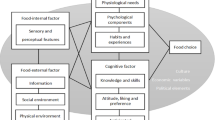Abstract
Globally, the prevalence of overweight and obesity has risen over the last 35 years, and is associated with higher incidence of a range of non-communicable diseases (Poirier et al. 2006; Ng et al. 2014). Commercial weight-loss programs (CWLP) support the population’s desire and need to lose weight (Cleland et al. 2001). This study is positioned as ‘transformative consumer research’ which seeks to understand consumer behaviour in order to benefit or improve the well-being of consumers themselves (Crockett et al. 2013; Ozanne et al. 2011).
Expectancy-value theory indicates that expectations, and the value or valence individuals place on them, are key drivers of human behaviour (Feather and Newton 1982; Feather 1992; Nagengast et al. 2011; Henning et al. 2012). Understanding expectations in relation to CWLP may benefit consumers by enabling them to make more informed purchase decisions (Ames et al. 2005). Marketing practitioners, entrepreneurs and weight-loss counsellors engaged in the delivery of CWLP may find the study provides useful insight regarding the expectations of their customers.
The purpose of the study was to explore participants’ expectations in relation to CWLP. Thematic analysis identified and describe major themes and sub-themes arising from 14 semi-structured interviews with past users of CWLP. In total, 25 major themes were identified, of which 15 related to positive and 10 to negative expectations. In summary:
Outcome expectations: Positive themes: ‘Lighter’, ‘Slimmer’, ‘Educated’ and ‘Keep it off.’ Negative themes: ‘Dependant’ and ‘Regain.’
Self-efficacy expectations: Positive themes: ‘Easy/Convenient, ‘Short-term’ and ‘Long-term.’ Negative themes: ‘Unsustainable’ and ‘Incompatible.’
Program performance expectations: Positive themes: ‘Nutritious/Delicious’, ‘Tools’ and ‘Guidance’, ‘Support’, ‘Flexibility’ and ‘Value’. Negative themes: ‘Unpalatable’, ‘Expensive’ and ‘Not good for me.’
Emotional expectations: Positive themes: ‘Optimistic’ and ‘Healthy change.’ Negative themes: ‘Ashamed’, ‘Moody’ and ‘Deprived.’
This study contributes to expectancy-value theory in marketing by highlighting the importance of considering consumers’ positive and negative outcome, self-efficacy, product performance and emotional expectations when seeking to understand motivations for consumer behaviour.
It concludes that a marketing approach which encourages consumers to have realistic expectations, and development of programs which align with consumers’ positive expectations and provide strategies to avoid or minimise the manifestation of negative expectations, could improve customer satisfaction and retention whilst also enhancing consumer well-being.
Access this chapter
Tax calculation will be finalised at checkout
Purchases are for personal use only
Similar content being viewed by others
Author information
Authors and Affiliations
Corresponding author
Editor information
Editors and Affiliations
Rights and permissions
Copyright information
© 2020 The Academy of Marketing Science
About this paper
Cite this paper
McEvedy, S., Sullivan-Mort, G., Paxton, S., D’Souza, C. (2020). The Highs and Lows of Consumer Expectations in Relation to Commercial Weight-Loss Programs: An Abstract. In: Pantoja, F., Wu, S., Krey, N. (eds) Enlightened Marketing in Challenging Times. AMSWMC 2019. Developments in Marketing Science: Proceedings of the Academy of Marketing Science. Springer, Cham. https://doi.org/10.1007/978-3-030-42545-6_94
Download citation
DOI: https://doi.org/10.1007/978-3-030-42545-6_94
Published:
Publisher Name: Springer, Cham
Print ISBN: 978-3-030-42544-9
Online ISBN: 978-3-030-42545-6
eBook Packages: Business and ManagementBusiness and Management (R0)




